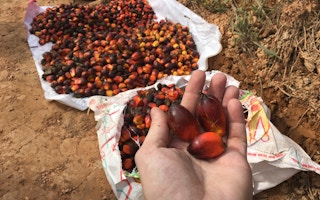Singapore-listed palm oil giant Golden Agri-Resources (GAR) on Monday announced that it has developed the industry’s most productive seeds.
To continue reading, subscribe to Eco‑Business.
There's something for everyone. We offer a range of subscription plans.
- Access our stories and receive our Insights Weekly newsletter with the free EB Member plan.
- Unlock unlimited access to our content and archive with EB Circle.
- Publish your content with EB Premium.
Scientifically known as Eka 1 and Eka 2, the seeds are being hailed by GAR as a breakthrough in palm oil productivity that could help bring an end to the need to clear forests to make way for new plantations.
Though oil palm is by far the world’s highest-yielding vegetable oil, the industry is plagued by unsustainable, unproductive farming practices that have led to deforestation and the burning of carbon-rich peatland in Indonesia and Malaysia.
The palm oil industry was largely blamed for the Indonesian forest fires of 2015 that engulfed Southeast Asia in toxic air pollution, which led Indonesia’s prime minister Joko Widodo to ban any expansion of new palm oil concessions. Widowo said then that the area already issued to oil palm growers could be more than twice as productive “provided they use the right seeds.”
GAR’s new seeds promise to increase yield from 7.5-8 tonnes of crude palm oil (CPO) per hectare per year for a tree of prime age, to more than 10 tonnes—more than three times the industry average.
The average yield of palm oil fruits in Indonesia has been stagnant at around 3.6-3.8 tonnes of oil per hectare per year for last 13 years.
The new seeds will also enable palm trees to reach maturity much faster. Typically, a palm tree starts to bear fruit 30 months after planting, but the new seeds will produce fruit within 24 months, and will produce a higher ratio of oil, according to GAR.
The Eka 1 seedlings are expected to yield 10.8 tonnes of CPO per hectare, and the Eka 2 seedlings will deliver an even greater 13.0 tonnes per hectare.
The company says the seeds are also more resistant to disease and drought.
A GAR spokesperson told Eco-Business that the seeds, which have been in development for more than 20 years, have not been genetically modified and were grown from tissue culture—that is, plant cells grown under sterile conditions and then cloned—at GAR’s biotechnology centre in Indonesia.
Production of the seeds, which have been approved for commercial cultivation by Indonesia’s Ministry of Agriculture and verified by scientists at the Bogor Institute of Agriculture, will be grown at scale through tissue culture over the next five years, and then commercially planted in Sumatra and West Kalimantan from 2022.
The seeds will be introduced to GAR’s own plantations first, and later made available to independent smallholders that supply GAR. Smallholder farmers are reputed to produce the lowest yields, and are most commonly blamed for starting fires to clear land for planting.
Daud Dharsono, president director of GAR subsidiary PT SMART Tbk, described the new seeds as a “breakthrough” that was essential to delivering sustainable production of palm oil to meet growing global demand.
Palm oil, a plant native to West Africa that is now cultivated mostly in Indonesia and Malaysia but also in Thailand, Columbia, Nigeria, Papua New Guinea and Ecuador, is an ingredient in roughly half of all supermarket goods, including toothpaste, biscuits and shampoo. Demand for the versatile oil has grown exponentially since the 1980s, but production took a major hit after the forest fires of 2015.
Dharsono said that the new seeds were part of the company’s efforts to identify and adopt new techniques to improve its own sustainable agricultural practices and those of the industry as a whole.
GAR has been making strides to lead the palm oil industry with sustainable forestry practices, and was the first to pledge to stop clearing peat forests to make way for plantations in 2011 following a hard-hitting campaign targeted at the company by environmental group Greenpeace.










